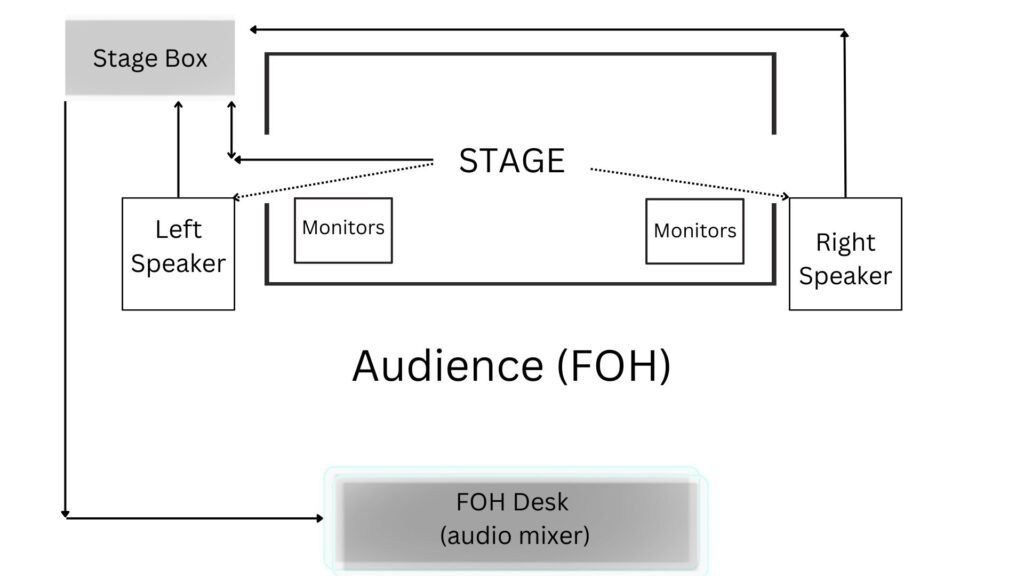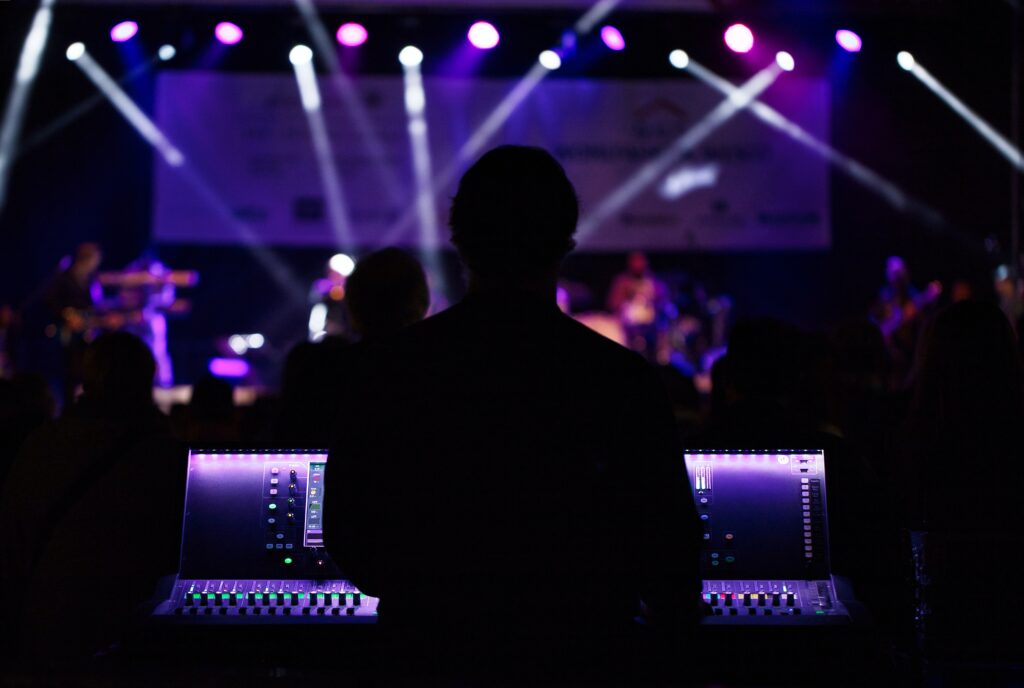Learn a few roles and responsibilities as well as the basic equipment needed to begin with live sound. Assuming you are a one-man band or want to get started with live sound so I will be keeping things very simple for a beginner to understand.
What is live sound?
Have you ever been to a house party or a wedding with a DJ or Jazz band playing in the background? What about seeing Ed Sheeran in concert? How about that time you saw a talented dance group at the street corner using a small speaker and a microphone to talk with their audience?
Live sound can be anything from a solo act to a big production using speakers, microphones, audio mixers, and any audio technology to enhance local entertainment for the community. Even though all eyes will be on stage, the live sound crew can make or break the show even before it starts. It’s important to have the right people who are knowledgeable in setting up and tearing down stages, assembling equipment, and ensuring the show runs as smoothly as possible.
Roles and Responsibilities
Many roles are responsible for creating an awesome live event, I will only be mentioning 2 common roles in small to medium open mic nights, marketplaces, restaurants, and churches. Although these same roles are still applied to large events, these positions don’t wear as many hats as they do in large events.
Stagehand
The stagehand crew set up and tear down an event whether in a small venue or large concert hall usually being the first to arrive and the last to leave. The job consists of hard manual labor such as loading and unloading trucks full of gear, laying down cables, miking instruments, setting up and/or rigging lights, and most likely setting up an actual stage if it is an outside venue.
This role is a great position to start if you are wanting to break into the industry and eventually move up to a live-sound engineer, rigger, stage manager, lighting designer, producer, and many more important roles that involve putting on a big show. Now, this job isn’t as fancy as being an audio engineer, but these guys and gals are tough! They put in long, hard-working hours before and after the show just for your entertainment. So if you see or meet one, give much respect.
Live Sound Engineer
Live sound engineers must have knowledge of the acoustics around them as well as trained ears to hear changes in frequencies during the event. These women/men have substantial knowledge of the gear they are using and must have great communication skills with their team.
Even though their main responsibility is to keep the sound of the performance to par, live sound engineers need to have certain leadership skills to keep the event efficient and organized. In larger productions, there usually will be a stage manager or producer who will take charge of on-stage performance schedules and such. But in smaller events, the live sound engineer is usually the one setting out fires that occur during a live performance, and that can become very stressful especially when there are hundreds of eyes witnessing an issue.
Wearing Multiple Hats
If you are doing a solo act, you might be wearing multiple hats, the sound engineer, stagehand, and performer for your gig. Ain’t that a b@%$. lol. okay no seriously, that’s awesome. It’s called dedication and passion. You aren’t letting gear or hard work stop you from doing what you love and that builds amazing character. So give yourself a high five and keep up the good work!
Another benefit of doing all this yourself can open so many doors for you in the music industry. Knowing live sound mixing can lead you to mix music for other musicians in a studio. Unloading and loading a truck full of your gear will show other bands how dedicated you are and will ask you to go on tour with them as a stagehand. I don’t know about you, but I wouldn’t mind getting paid to travel and be around music all the time. My point is don’t think wearing multiple hats for your gig is a waste of time, it can open many opportunities for you.
Now there will be a time when you will need to advance your gear or want more time to focus on your craft requiring you to hire some help. That isn’t wrong either, it might be the best decision for you to double your performance and possibly your income. Either way, make sure it’s at the right time for you.
Equipment used in Live sound
The equipment used in live sound will differ per occasion. I assume you are a one-man band or want to get started with live sound engineering, so I will give you a basic equipment list of what you will need to get started. If you would like to know about specific gear check out our equipment recommendation page under the live sound section.
- Speakers : This can vary in your location and how many instruments you plan to use
- Cables: such as XLR, 1/4 instrument cables, audio snake, etc…
- Mixing board or stage box: a console to help send, control, record and manipulate audio
- Microphones: dynamic mikes are commonly used
- Monitors/Wedges: in-ear monitors are becoming more common
Common layout in Live Sound
The image below gives you a basic rundown of where your speakers and mixing desk will be located. The signal flow will begin from the stage and L/R speakers and connect strait to the stage box via XLR or speaker cables. From the stage box, the audio snake will then run back to the front of house desk ( FOH Desk) where your audio mixer will be used to control your sound.
If you don’t have a stage box or a mixer, you can connect directly to your speakers (dotted arrows). Usually, speakers will allow 2 mic inputs with a few line inputs, which depends on the model of your speaker. A big reason why audio mixers are used in live sound are because of the number of inputs and how much equipment you want to add to your performance. Check out our articles if you would like to know more about the fundamentals of a mixer.

How to get started?
So how do you get started with live sound? Of course you can go to school and earn a degree in this field. Or you can get an online course, check out live sound articles or other awesome blogs like this one! To get hands on learning check out places you can volunteer at such as your community church, open mic nights, restaurants, or start your own live gigs. A lot of these locations need help with setting up stages, helping out with sound check or even being apart of the worship team. I guarantee you will learn so much by reaching out to your local community.
If you would like to learn more or have more to say, leave a comment down below! I would love to hear how you got started with Live Sound.
